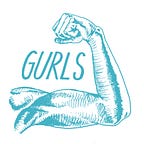Raising Allies Podcast
GURLS Year 3 focuses around the theme: Connect. Participants learn how to build their network and connect with prospective allies to support their cause.
For our Fall 2020 Year 3 GURLS project, Mathilda Meyerhoff, Emily Denio, and Mia Beeman-Weber created a podcast called Raising Allies, which focuses on conversations with a diverse group of ultimate frisbee players to unpack the importance of intersectionality and learn to engage in meaningful allyship. Check out the podcast, Raising Allies, here.
Mathilda, Emily, and Mia allowed us to turn the mic around to hear from them on why they chose to create this podcast and how their experience in the GURLS program has impacted them.
What inspired you to create a podcast for your Year 3 project?
Emily: In Year 3 of GURLS the service project is supposed to be some sort of equity workshop. We knew that leading a traditional workshop wouldn’t be possible because of COVID, and we were feeling zoom-ed out (and assumed others would be too). We all were interested in exploring the podcast world, and we thought it would be cool for listeners to be able to access the podcast anywhere and at anytime that worked for them.
Mathilda: As high schoolers who have been overwhelmed with zooms for the last year, we thought a podcast would be a nice change of pace, and allow for us to share our information without needing to look at a screen.
Who would be your dream guest for the podcast and why?
Emily: I would love to interview Shanye Crawford, who has done a lot of work with Disc Diversity and is a leading voice for racial equity in the frisbee community. I’d also love to talk to Opi Payne and Amel Awadelkarim from Fury who both have experience playing in the Bay Area and in other parts of the country, and who are players I enjoy watching.
How can the Ultimate community support your podcast project?
Mathilda: Give the pod a listen! It’s only half an hour and definitely can change your perspective on how intersectionality exists within the ultimate community, and hopefully even inspire you to reflect on your own teams and think about how we can be better allies to those around us.
Emily: Listen and share with your teams!
How have you grown over the course of your time in the GURLS program?
Mia: The biggest change that I have seen in myself since starting GURLS is an improvement in interactions that I have on the field. I not only have a deeper understanding of how various aspects of my identity impact my experiences, but I am able to apply this understanding to how I interact with people. I have gotten much better at giving feedback in a constructive manner.
Mathilda: Since we have heavily focused on intersectionality rather than just gender (unlike previous years of GURLS) I feel as though I have a much deeper understanding of racial inequities and how they exist within the ultimate community where I might not have seen them before. Beyond that I now understand how both race and gender overlap (as well as many other layers of identity), and further contribute to the issues of inequality present within the ultimate community. With this new knowledge I feel that I can be a better ally to those who have difference experiences than my own.
What is your most important takeaway from your time in the GURLS program?
Emily: My most important takeaway from my time in the GURLS Program is that there are many different ways to be a leader. I’m a naturally quiet person, and for a long time I assumed that I could never be a leader because I didn’t fall into the loud or more assertive leadership stereotypes. That’s not true at all, and the GURLS Program has showed me that there are many types of leadership roles! I feel much more confident in my own abilities and value as a leader, and I think it’s important that we continue to help young people who have been historically excluded from leadership roles to meet their full potential as leaders.
Mia: My biggest takeaway from GURLS is that understanding the intersectional relationship of people’s identities is key to making positive change. I spent a long time only thinking about my existence in this sport through the impact that gender divisions I played in had on it. Until a couple years ago, I hadn’t considered the impact that my being white had on how easily I navigate frisbee spaces. I am still working to understand and unpack the relationship of my identities and how they dictate my frisbee experience. I am starting to understand that it is a lifelong process of unpacking my biases, and GURLS really helped me begin to take a critical look at how my identities impact my existence in the frisbee community.
What would you say to someone who is thinking about applying to the GURLS Program?
Mathilda: It is an amazing program full of open minded, supportive people who would love to meet you. GURLS also provides a space that is safe for you to both better understand the dynamics of playing a competitive co-ed sport, and especially help you feel confident within that space.
Mia: GURLS is an incredible program where I learned so much about how to be an effective leader. The community of people is so kind and it is a wonderful opportunity to meet new people and to learn how to work with others. I had so much fun these past few years and I am confident that you will have the same experience!
Find out more and apply to the 2021 GURLS Program here!
